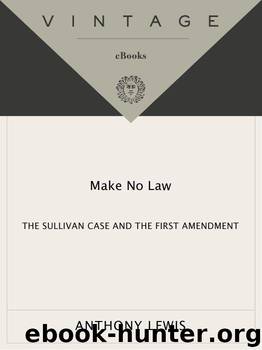Make No Law: The Sullivan Case and the First Amendment by Lewis Anthony

Author:Lewis, Anthony [Lewis, Anthony]
Language: eng
Format: mobi, epub
ISBN: 9780307787828
Publisher: Vintage
Published: 2011-04-19T16:00:00+00:00
16
INSIDE THE COURT
IT WAS just two months and three days from the argument of New York Times Co. v. Sullivan to the decision. This was a short time to decide an important case, and to do so in a way that broke so much new ground. Justice Brennan had had to win the agreement of colleagues with very different legal philosophies. It was especially noteworthy—remarkable, some observers thought—that his opinion was joined without qualification by Justice Harlan, whose concern for state powers in our federal system might have been expected to make him wary of imposing national constitutional rules on the law of libel. But there was no sign of discord among the six who joined the opinion of the Court. It appeared that Justice Brennan’s account of history and legal analysis had readily persuaded a majority to join him.
The facts were otherwise. Justice Brennan had great difficulty marshaling a majority and holding it. He wrote eight different drafts of his opinion. Until the last moment there was a real possibility, even a probability, that it would not command a majority. Not until the evening of March 8, the night before Justice Brennan announced the decision, did Justice Harlan agree to join him without reservations.
What happened between the argument and the decision emerges in Justice Brennan’s papers. His Court files—drafts of opinions, comments received from other justices and so on—are in the manuscript division of the Library of Congress. There is another important source. During Justice Brennan’s thirty-four years on the Court, his law clerks each term wrote accounts of the process of decision in each case in which he was significantly involved—as the writer of the Court’s opinion or a dissent, for example. The report on the Sullivan case was written by Stephen R. Barnett, one of his two law clerks at the time, later a professor of law at the University of California, Berkeley. His account tells the story in considerable detail. By following the changes from draft to draft one gets a rare insight into the process of opinion writing on the Supreme Court. Ideas were added and subtracted, and language made more compelling, as Justice Brennan reordered his own thoughts and sought to gather a majority.
The justices’ practice was and is to discuss argued cases in their conference at the end of each week of argument. Times v. Sullivan was discussed on January 10, 1964. In his description of the decisional process, Barnett wrote: “At the oral argument … Professor Wechsler, for The Times, had based his argument for reversal on virtually the broadest possible ground—that all libel suits by public officials based on statements concerning their official conduct were barred by the First Amendment.” This comment overlooked Wechsler’s efforts at the argument, frustrated by questions from the justices, to move on to his alternative narrower grounds.
In any event, Barnett’s account reported that at their conference all nine justices were in favor of reversing the Alabama judgment, but that most of them were inclined to do so on an extremely narrow ground.
Download
Make No Law: The Sullivan Case and the First Amendment by Lewis Anthony.epub
This site does not store any files on its server. We only index and link to content provided by other sites. Please contact the content providers to delete copyright contents if any and email us, we'll remove relevant links or contents immediately.
| Civil Rights | Discrimination |
| General | Human Rights |
Day by Elie Wiesel(2778)
The Age of Genius by A. C. Grayling(2571)
Gideon's Spies: The Secret History of the Mossad by Gordon Thomas(2331)
The Gulag Archipelago (Vintage Classics) by Aleksandr Solzhenitsyn(2078)
FATWA: Hunted in America by Pamela Geller(1994)
Columbine by Dave Cullen(1862)
Men Explain Things to Me by Rebecca Solnit(1718)
The Rule of Law by Bingham Tom(1679)
Anatomy of Injustice by Raymond Bonner(1654)
Examples & Explanations: Administrative Law by William F. Funk & Richard H. Seamon(1631)
Three Cups of Tea by Greg Mortenson(1606)
The Source by James A. Michener(1601)
That Every Man Be Armed by Stephen P. Halbrook(1575)
ADHD on Trial by Michael Gordon(1568)
Future Design by Unknown(1563)
Gideon's Spies by Gordon Thomas(1497)
Palestinian Walks by Raja Shehadeh(1494)
Constitutional Theory by Carl Schmitt(1448)
Nothing to Envy by Barbara Demick(1440)
